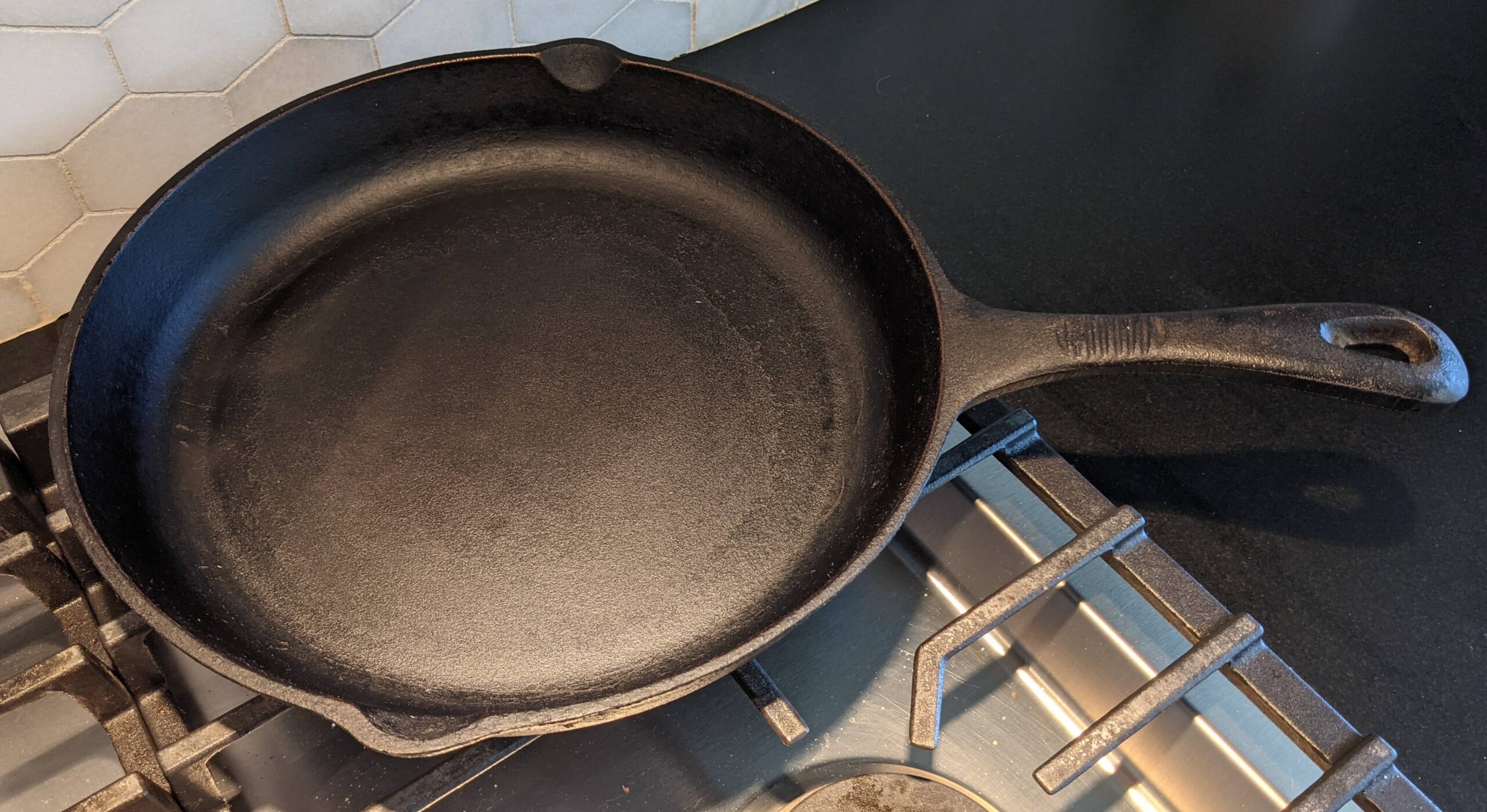When it comes to seasoning your cast iron cookware, choosing the right oil is crucial. A properly seasoned cast iron pan provides a natural non-stick surface and enhances its durability. In this blog post, we will explore the best oil options for seasoning your cast iron, as well as provide tips and techniques to ensure you achieve the best results.
Table of Contents
Understanding Seasoning on Cast Iron
Seasoning is a crucial step in maintaining and enhancing the performance of your cast iron cookware. It involves creating a protective layer on the surface of the pan by applying oil and heating it. This process not only prevents rust and corrosion but also develops a natural non-stick coating that improves the cooking experience.
When it comes to seasoning cast iron, the type of oil you use plays a significant role. The oil acts as a binder, filling in the tiny pores and gaps on the surface, creating a smooth and durable layer. It also helps in preventing food from sticking to the pan, making it easier to cook and clean.
Not all oils are suitable for seasoning cast iron. The best oils for this purpose are those with a high smoke point and good fat composition. Oils like flaxseed, grapeseed, and canola oil are popular choices due to their ability to polymerize and create a hard, slick surface. These oils are also less prone to rancidity, ensuring that your cast iron remains in top condition for a long time.
Recommended Oils for Seasoning Cast Iron
When it comes to seasoning your cast iron cookware, using the right oil is crucial to achieve the best results. Manufacturers often recommend specific oils that are known for their high smoke points and ability to create a durable non-stick surface on the cast iron.
Two popular oils that manufacturers recommend for seasoning cast iron are grape seed oil and avocado oil. Let’s compare these two options:
Grape Seed Oil
Grape seed oil is a great choice for seasoning cast iron due to its high smoke point and neutral flavor. It forms a strong bond with the cast iron surface, creating a protective layer that helps prevent food from sticking. Additionally, grape seed oil is rich in antioxidants, making it a healthier option for cooking.
Avocado Oil
Avocado oil is another excellent option for seasoning cast iron. With its high smoke point and mild flavor, it provides a smooth and even seasoning on the cast iron surface. Avocado oil is also packed with beneficial nutrients, such as vitamins E and K, which can enhance the seasoning process and improve the overall quality of your cast iron cookware.
Additional Oil Options
While grape seed oil and avocado oil are highly recommended for seasoning cast iron, it’s worth exploring other fats and oils as well. Some alternatives you might consider include coconut oil, flaxseed oil, or even traditional animal fats like lard or bacon grease. Each of these options has its own unique qualities and can contribute to the development of a well-seasoned cast iron pan.
Remember, the key to successful seasoning is to choose an oil with a high smoke point and to apply multiple layers of seasoning. By following the manufacturer’s recommendations and experimenting with different oils, you can find the best oil that suits your preferences and helps maintain the longevity of your cast iron cookware.
What NOT to Use for Cast Iron Seasoning
When it comes to seasoning your cast iron cookware, choosing the right oil is crucial. While there are plenty of options available, there are certain oils that you should avoid using for cast iron seasoning. Here are a few oils you should steer clear of:
1. Vegetable Oil
Although commonly used in cooking, vegetable oil is not the best choice for seasoning cast iron. It tends to leave a sticky residue that can become rancid over time.
2. Olive Oil
While olive oil is a healthy choice for many dishes, it is not ideal for cast iron seasoning. Its low smoke point can cause it to break down and form a sticky layer on your cookware.
3. Butter
Although butter adds great flavor to meals, it is not suitable for cast iron seasoning. Butter contains milk solids that can leave a sticky residue on your cookware.
4. Flaxseed Oil
Despite its popularity among some cast iron enthusiasts, flaxseed oil is not recommended for seasoning. It has a tendency to polymerize unevenly, resulting in a sticky and uneven surface.
5. Canola Oil
While canola oil is a common choice for cooking, it is not the best option for cast iron seasoning. It can leave a sticky residue and may not provide a durable seasoning.
Tips and Techniques for Seasoning Cast Iron
Seasoning cast iron is an essential step in maintaining and enhancing the performance of your cookware. By creating a natural, non-stick surface, a well-seasoned cast iron pan becomes a versatile tool in the kitchen. Here are some tips and techniques to help you achieve the best results:
Step-by-Step Guide on How To Season Cast Iron With Oil:
1. Start by washing your cast iron pan with hot water and a mild detergent to remove any manufacturing residue. Rinse thoroughly and dry completely.
2. Preheat your oven to 375°F (190°C).
3. Apply a thin layer of high smoke point oil, such as avocado oil, flax seed oil, or canola oil, to the entire surface of the pan, including the handle and exterior.
4. Use a paper towel to remove any excess oil, ensuring a thin and even coating.
5. Place the pan upside down on the middle rack of your oven, with a sheet of aluminum foil or a baking tray on the bottom rack to catch any drips.
6. Bake the pan for one hour, then turn off the oven and allow the pan to cool completely before removing.
Common Mistakes To Avoid When Seasoning Cast Iron:
1. Using too much oil can lead to a sticky and uneven surface. Remember, a thin layer is sufficient.
2. Not drying the pan thoroughly after washing can result in rust formation.
3. Using oils with low smoke points, such as olive oil, can create a sticky residue that is difficult to remove.
4. Skipping the preheating step can prevent the oil from bonding properly to the pan’s surface.
How To Maintain and Prolong the Seasoning of Cast Iron:
1. After each use, clean your cast iron pan with hot water and a brush or sponge. Avoid using soap, as it can strip away the seasoning.
2. Dry the pan thoroughly and apply a light coat of oil to prevent rusting.
3. Store your cast iron cookware in a dry place to avoid moisture buildup.
4. If your pan starts to lose its seasoning, simply repeat the seasoning process to restore its non-stick properties.
Benefits of Properly Seasoned Cast Iron
Properly seasoning your cast iron cookware can bring a multitude of benefits to your cooking experience. Not only does it create a natural non-stick surface, but it also enhances the flavor of your dishes and improves the overall cooking performance. Additionally, a well-seasoned cast iron pan can last for generations with proper care and maintenance.
One of the primary advantages of seasoning your cast iron is the improved non-stick properties it provides. When seasoned correctly, the surface becomes slick and smooth, preventing food from sticking. This makes cooking delicate items like eggs, pancakes, and fish a breeze, as they effortlessly glide across the surface without leaving a mess.
Furthermore, a properly seasoned cast iron pan adds a unique depth of flavor to your dishes. The seasoned layer acts as a natural seasoning agent, infusing your food with subtle hints of richness and enhancing its overall taste. Whether you’re searing a steak or sautéing vegetables, the seasoned surface helps to develop delicious flavors that will impress even the most discerning taste buds.
Another advantage of properly seasoning your cast iron is the longevity it provides to your cookware. With regular seasoning and proper care, cast iron pans can withstand years of use without losing their effectiveness. The seasoning layer acts as a protective barrier against rust and corrosion, ensuring that your pan remains in top condition for years to come.
To care for your cast iron cookware, it’s important to clean it properly after each use. Avoid using harsh soaps or abrasive scrubbers that can strip away the seasoning. Instead, rinse the pan with warm water and gently scrub with a soft brush or sponge. After cleaning, be sure to thoroughly dry your cast iron to prevent any moisture from causing rust.
Properly seasoning your cast iron cookware offers a range of benefits that enhance your cooking experience. From improved non-stick properties to enhanced flavor and longevity, a well-seasoned cast iron pan is a valuable addition to any kitchen. By investing a little time and effort into seasoning and caring for your cast iron, you can enjoy its benefits for years to come.
Conclusion
In summary, choosing the right oil for seasoning your cast iron cookware is crucial for maintaining its longevity and enhancing its non-stick properties. After thorough research and consideration, we have found that the best oil for seasoning cast iron is Chosen Foods 100% Pure Avocado Oil. This oil creates a durable and smooth seasoning layer that protects your cast iron from rust and provides excellent release properties.
By using Chosen Foods 100% Pure Avocado Oil, you can ensure that your cast iron cookware remains in pristine condition, ready to deliver exceptional cooking performance every time. Its high smoke point and natural ingredients make it a safe and healthy choice for all your culinary creations.




